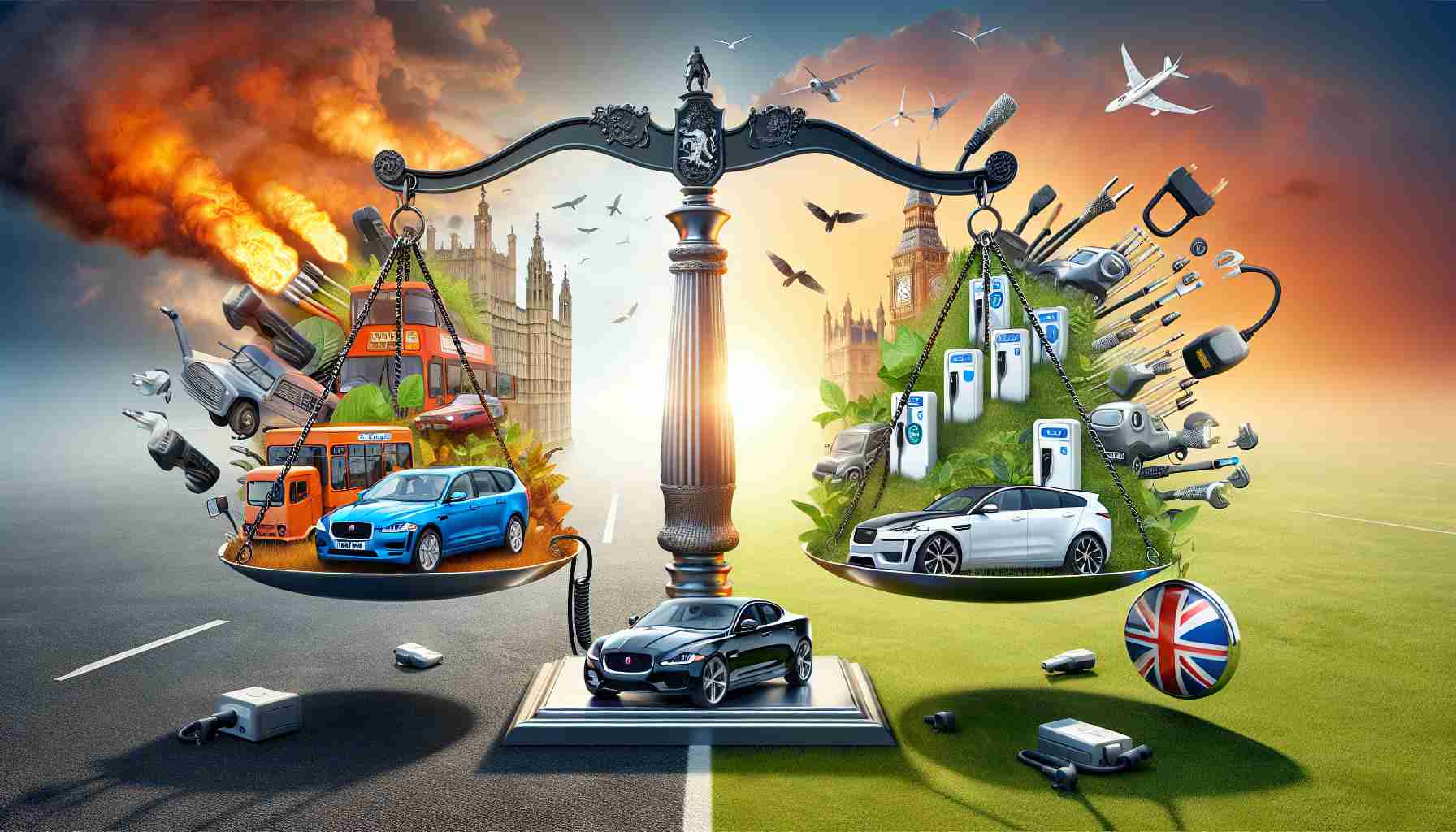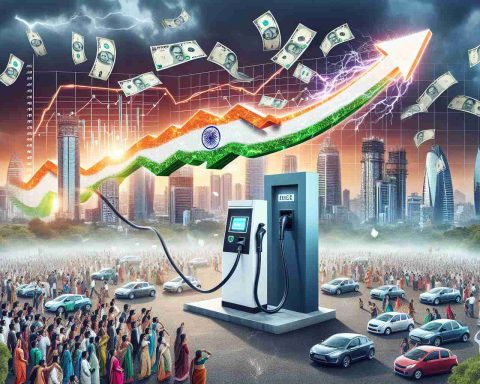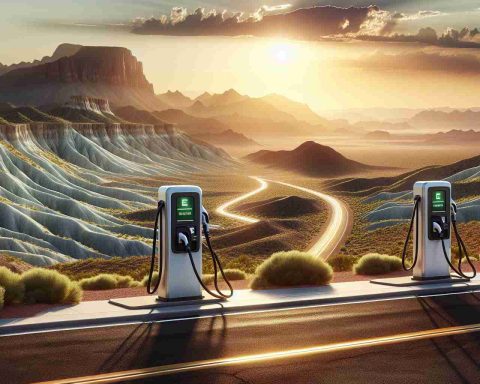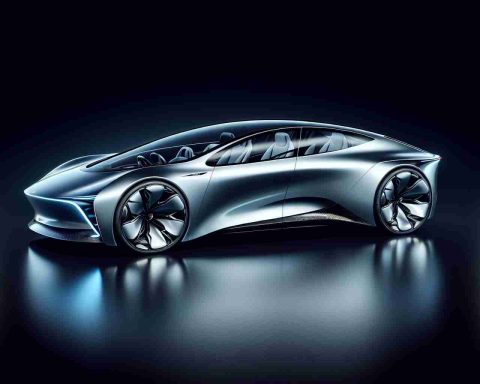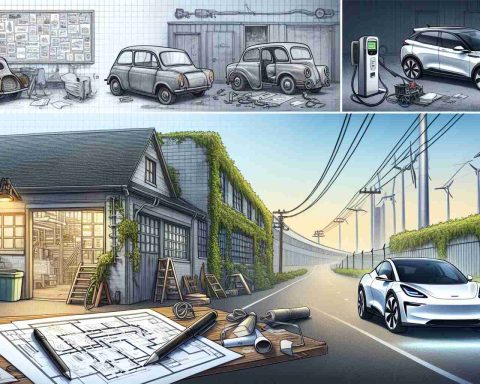- Jaguar Land Rover (JLR) faces challenges due to strict UK electric vehicle (EV) quotas, risking their £18 billion investment and 34,000 jobs.
- Government mandates and low EV demand led JLR to reduce prices, resulting in a £4.5 billion loss.
- The Labour government plans a 2030 ban on petrol and diesel cars, increasing pressure on JLR for policy changes.
- Stricter regulations promise environmental benefits but face obstacles like financial strains and insufficient infrastructure.
- Projections foresee a 60% UK EV market share by 2030, contingent on supportive policies and infrastructure.
- Successful transition requires adaptable regulations balancing industry needs and consumer readiness.
Jaguar Land Rover (JLR) stands at a crossroads as the UK steers towards an electric future. The automotive giant, a key player in the nation’s industry, warns that stringent electric vehicle (EV) quotas could threaten not only their hefty £18 billion investment in manufacturing but also the jobs of over 34,000 employees. The stakes couldn’t be higher, and the clock is ticking.
Behind the Caution: Burdened by government mandates, the demand for EVs lags behind expectations, forcing JLR to slash prices last year, leading to a staggering £4.5 billion loss. As the Labour government aims to reinstate a 2030 ban on petrol and diesel vehicles, JLR’s CEO underscores the need for immediate policy shifts. Current zero-emission vehicle targets risk derailing one of the UK’s flagship industries.
The Balancing Act: Enhanced regulations hold potential environmental benefits and could spark innovation. But they also pose financial strains and infrastructural challenges. Without sufficient charging stations and consumer readiness, the industry’s transition could falter, risking jobs and investment.
Looking Ahead: Projections suggest the UK EV market could command a 60% share by 2030 if supported by robust policy and infrastructure. Yet, reaching this goal requires adaptive regulations—a flexible approach to zero-emission quotas could ease the transition for both manufacturers and consumers.
As JLR and the UK government navigate this precarious landscape, the outcome could reshape the nation’s automotive destiny. Will they strike the right balance to ensure a thriving electric future? The answer hangs in the balance, ready to redefine the UK’s role in the global automotive revolution.
Is JLR’s Electric Future at Risk? Discover the Shocking Truth About the UK’s EV Push!
Which Factors are Impacting JLR’s Transition to Electric Vehicles?
Jaguar Land Rover’s transition towards electric vehicles is heavily influenced by several key factors:
1. Government Mandates and Quotas: The UK government’s stringent electric vehicle quotas demand rapid shifts from traditional petrol and diesel vehicles to electric models. These mandates have placed immense pressure on JLR, pushing them towards hasty implementation that could impact their financial health and workforce stability.
2. Market Demand and Consumer Readiness: Despite advanced EV technology, consumer demand has not met expectations. Many potential buyers are hesitant due to high costs and limited charging infrastructure. This reluctance forces companies like JLR to reduce prices, impacting profits.
3. Infrastructure Challenges: The lack of a comprehensive charging network is a significant barrier. Both urban and rural areas face challenges in accommodating the EV boom, making it harder for consumers to adopt electric vehicles confidently.
For more information, visit Jaguar Land Rover.
What are the Potential Innovations and Advantages for JLR in Embracing EVs?
Jaguar Land Rover’s shift towards electric vehicles brings potential innovations and advantages:
1. Technological Advancements: Investment in EV technology can lead to groundbreaking innovations in vehicle design, efficiency, and performance. JLR has the opportunity to become a leader in these advancements, setting industry standards.
2. Environmental Benefits: Transitioning to electric aligns with global sustainability goals, reducing emissions and minimizing environmental impact. JLR’s commitment to electric vehicles can enhance its brand image as an environmentally responsible company.
3. Increased Market Share: By aligning with government targets and eventually stabilizing production, JLR can capture a significant share of the growing EV market. This gives the company a competitive edge in both domestic and international arenas.
Explore more about developments in the auto industry at Jaguar Land Rover.
How Can the UK Government Assist JLR and the Automotive Industry?
The UK government can support JLR and the broader automotive industry with these strategies:
1. Policy Flexibility: Adjusting zero-emission quotas and providing a more phased approach can ease the transition for manufacturers and consumers. Flexible policies will ensure that companies can adapt without severe financial repercussions.
2. Infrastructure Investment: Expanding the charging network is crucial. Government investment in infrastructure can address consumer reluctance and support EV adoption across the nation.
3. Incentives and Subsidies: Offering financial incentives for EV purchases and R&D subsidies can spur both consumer interest and corporate innovation.
For a broader perspective on automotive policies, go to Jaguar Land Rover.
